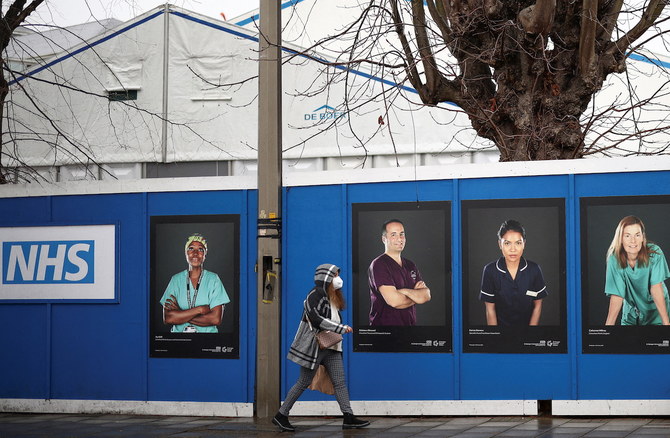LONDON: Over 900 migrants in the UK have declined medical treatment after being required to pay upfront fees over the last two years, The Guardian reported on Sunday.
According to data obtained under the Freedom of Information Act, 3,545 patients across 68 hospital trusts in England have been told they must pay upfront costs totaling £7.1 million ($9 million) since January 2021. Of those, 905 patients did not proceed with treatment.
Since October 2017, NHS trusts in England have required upfront payment before treating certain migrants with elective care. This applies to foreign visitors and migrants who have been determined ineligible for free healthcare, such as unsuccessful asylum applicants and those who have overstayed their visas.
In 2018, The Guardian reported the case of 71-year-old cancer patient Elfreda Spencer, who died after being denied chemotherapy for a year.
Before having a stroke, personal trainer Simba Mujakachi was rejected treatment for a blood-clotting disease in 2019 due to the upfront fee policy.
“The hospital told me I had to pay thousands of pounds before I came in for surgery and that having a debt could affect my asylum application, so I didn’t go, even though I knew I needed it,” he told The Guardian.
Mujakachi continued: “I didn’t have that kind of money and I was not allowed to work. And then, just before I turned 30, I had a brain hemorrhage and a stroke that left me disabled.
“The inhumane treatment I have been subject to under the hostile environment over the past 10 years was the cause of my life-changing stroke. I think about what would have happened if I had been able to get the treatment I needed like everyone else.”
Oke, who moved to the UK from Nigeria in 2007, was diagnosed with Fabry disease in 2020 after suffering a stroke, kidney failure, and infection with COVID-19. He needed enzyme replacement therapy to help avoid future organ damage and strokes, but it was not available unless he could either legalize his immigration status or pay.
Oke involved the medical group Doctors of the World, his MP Afzal Khan, and the parliamentary and health service Ombudsman in his case during three years of increasing pain. A week later, the hospital trust agreed to provide ERT.
“I felt like I was being treated like an animal, not a human being,” said Oke.
“It’s been awful, because apart from the physical pain there’s also the mental pain, not knowing what’s going on, what could happen next. It’s been a nightmare,” he added.
Although the policy is not supposed to cover urgent or “immediately necessary” treatment, The Guardian reported several cases of people wrongly denied treatment.
“Access to healthcare to all living in the UK, including secondary care, where we often see the most pressing health issues, should and can be equal, based on need and never dependent on someone’s financial or immigration status,” Amardeep Kamboz, head of services at Doctors of the World UK, told The Guardian.
A Department of Health and Social Care spokesperson told The Guardian: “The NHS is a residency-based healthcare system, and entitlement to free hospital care is based on being lawfully and properly settled in the UK.
“People who are not ordinarily resident here must contribute to the cost of their care unless exempt from charge, such as refugees.
“Payment is only required upfront in non-urgent cases when the care can safely occur after the patient’s departure from the UK.
“Immediately necessary or urgent care must never be withheld or delayed pending payment, as charges for this care can be recovered afterwards by installments or written off as unrecoverable if the patient cannot pay.”


























